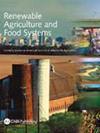The impact of livestock farm size on manure disposal modes: sell, give away or self-use
IF 2
3区 农林科学
Q2 AGRICULTURE, MULTIDISCIPLINARY
引用次数: 0
Abstract
Abstract Two prevailing trends in livestock production include increasing farm sizes and higher recycling rates of manure. Using beef cattle farms in China as a case study, we examine the impact of farm size on farmers' choice of manure disposal modes. Three forms of manure disposal modes are identified: (1) selling to neighboring farmers, (2) giving away to neighboring farmers and (3) self-use. Based on primary data from a field survey of beef cattle farmers in China, we estimate the choice of the above-mentioned three disposal modes using the constrained singular Seemingly Unrelated Regression (SUR) model. We find a significant and nonlinear impact of farm size on farmers' choice of manure disposal modes. Specifically, there is a significant and inversed U-shaped relationship between farm size and manure giving away, and a significant U-shaped relationship between farm size and manure selling or self-use. We additionally find several other factors that affect farmers' choice of manure disposal: the educational level of a farmer has a positive impact on manure selling; the better a farmer's physical health condition, the more likely the farmer self uses manure and less likely gives it away; land acquisition, as well as engagement in crop farming, increases manure self-use and reduces manure giving away and selling; the availability of manure treatment facilities reduces manure self-use; and the willingness of nearby crop growers to accept manure significantly decreases manure self-use and increases manure selling and giving away. Policy implications are also discussed.畜牧场规模对粪便处理方式的影响:出售、赠送或自用
摘要畜牧业生产的两个主要趋势包括农场规模的增加和粪便回收率的提高。以中国肉牛养殖场为例,我们考察了养殖场规模对农民粪便处理方式选择的影响。确定了三种形式的粪肥处理模式:(1)出售给邻近农民,(2)赠送给邻近农民和(3)自用。基于对中国肉牛养殖户的实地调查的初步数据,我们使用约束奇异似不相关回归(SUR)模型估计了上述三种处理模式的选择。我们发现,农场规模对农民选择粪肥处理模式有显著的非线性影响。具体而言,农场规模与肥料赠送之间存在显著的倒U型关系,农场规模和肥料出售或自用之间存在显著U型关系。此外,我们还发现了影响农民粪肥处理选择的其他几个因素:农民的教育水平对粪肥销售有积极影响;农民的身体健康状况越好,农民自己使用粪肥的可能性就越大,而不太可能将粪肥泄露出去;土地征用以及参与作物种植,增加了肥料的自用,减少了肥料的赠送和销售;粪肥处理设施的可用性减少了粪肥的自用;附近作物种植者接受粪肥的意愿显著减少了粪肥的自用,增加了粪肥销售和赠送。还讨论了政策影响。
本文章由计算机程序翻译,如有差异,请以英文原文为准。
求助全文
约1分钟内获得全文
求助全文
来源期刊

Renewable Agriculture and Food Systems
农林科学-农业综合
CiteScore
5.20
自引率
7.40%
发文量
39
审稿时长
>36 weeks
期刊介绍:
Renewable Agriculture and Food Systems (formerly American Journal of Alternative Agriculture) is a multi-disciplinary journal which focuses on the science that underpins economically, environmentally, and socially sustainable approaches to agriculture and food production. The journal publishes original research and review articles on the economic, ecological, and environmental impacts of agriculture; the effective use of renewable resources and biodiversity in agro-ecosystems; and the technological and sociological implications of sustainable food systems. It also contains a discussion forum, which presents lively discussions on new and provocative topics.
 求助内容:
求助内容: 应助结果提醒方式:
应助结果提醒方式:


